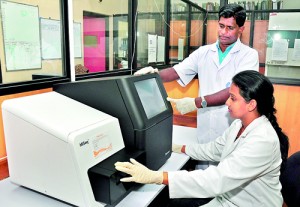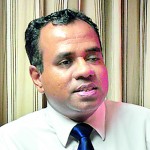Medicine’s new frontier
It is not just preaching, but also practising what he preaches.
“I have a pre-disposition for glaucoma (an eye condition) and also dry skin. Armed with this information I can get myself screened for glaucoma regularly and keep this disease at bay,” says Prof. Vajira H.W. Dissanayake urging that genetic testing should be the right of all Sri Lankans.
This is the ‘new frontier’ of medicine which enables personalised treatment of patients. Thinking genetics has to be part of medical practice, reiterates Prof. Dissanayake, the Director of the Human Genetics Unit (HGU) of the Faculty of Medicine, University of Colombo.
The HGU is on the threshold of launching the first ‘Genomic Medical Clinic’ within the hallowed portals of the Medical Faculty down Kynsey Road in Colombo 7. (See box)

Scientists working on the latest MiSeq Next Generation Sequencer from Illumina, the world’s No. 1 technology company, that was just installed at the Human Genetics Unit (HGU), Faculty of Medicine, University of Colombo. This will help undertake fast, accurate and relatively inexpensive gene sequencing enabling the HGU to offer Genomics based health care in Sri Lanka. Pix by Mangala Weerasekera
While pointing out that the lack of genetic technology in this country is causing unnecessary expenditure on health care, he brings to the fore two recent cases where genomic testing helped the parents of two children to find answers to numerous questions they had been grappling with for awhile.
One child had abnormal genitalia and an exome analysis (testing all genes for mutations in one go) found that such an abnormality caused by a mutation was usually described only in mentally-retarded patients. It was then that the doctors recognised the need to look into the child’s developmental aspects as well, in addition to surgical correction of the abnormality.
The other child had certain features of a dysmorphic condition and when tested it was found that the patient had a gene where he had one mutation inherited from the father and another mutation inherited from the mother. “This was unusual because in this particular condition, the parents should have been affected because they had one mutation, but they were not. The child, however, who had inherited both mutations, was affected. This was the first such case reported anywhere in the world,” says Prof. Dissanayake.
Referring to rupees and cents, it is Prof. Dissanayake’s view that although Sri Lanka has achieved good indicators in the infant mortality rate (IMR) and maternal mortality rate (MMR), the long journey ahead in the health sector is strewn with different challenges.
The treatment of non-communicable diseases (NCDs), the bane of the modern era, as against communicable diseases which were commoner in causing mortality earlier, is more expensive, it is learnt, thus making the health budget sky-rocket.
This is why the need to embrace genetic technology is great and Prof. Dissanayake cites some examples:
• Thalassaemia – about 5% of the recurrent health budget is spent on 2,000 to 3,000 thalassaemic patients. The rest of us have to bear with that and there is no equitable distribution of resources, points out Prof. Dissanayake, explaining that an estimated 15 % of new cases of thalassaemia are the second child in a family.

Prof. Vajira H.W. Dissanayake
So with genetic testing and appropriate counselling, we would be able not only to prevent such births, but also the agony that these families go through. Thereafter, carrier-testing and pre-pregnancy counselling should follow automatically and such couples guided in the direction of intra-uterine insemination (IUI) or in-vitro fertilisation (IVF) to help them have a healthy baby.
• Further reducing the IMR – currently the IMR is around 9 per 1,000 and of this 20% is due to birth defects. There are many autosomal recessive genetic conditions prevalent in Sri Lanka, but we do not pick them up because there is no systematic evaluation of ill infants to identify the underlying genetic condition.
If there is a dedicated service, the sorrow that many parents undergo over the death of a baby could be prevented, with relief and treatment being offered as follow-up.
• Sub-fertility – 1 in 7 couples is said to be sub-fertile in Sri Lanka and many more face repeated spontaneous abortions (miscarriages), causing a heavy burden on the health service. According to Prof. Dissanayake patients come with huge files like a thesis of repeated investigations and repeated consultations but still unable to conceive a baby. They should be offered genetic evaluation to determine whether they can have a baby.
Referring to a private hospital which is offering fertility services, Prof. Dissanayake says that doctors there had found that in spite of treatment, many patients were not able to conceive and began referring all their patients for genetic testing. “When referred to us, we did a chromosome analysis and detected abnormalities. 1 in 30 couples had an abnormality which was preventing childbirth. Armed with this knowledge couples were offered IUI or IVF with donor gametes and almost all of them are now happy parents. In spite of the availability of such services many couples undergo repeated treatment without genetic evaluation, which is like groping in the dark.
• Couples who are related (consanguineous) but wish to get married and are worried about the mutations that may occur in the babies they have. “We can perform an entire genetic panel to ascertain whether the couple is sharing the same genetic mutations. If determined by genetic testing that they are carriers of the same mutation, they can look at alternatives such as using donor sperm or donor eggs,” says Prof. Dissanayake.
• Chronic conditions which are never diagnosed — 1 in 10 on this planet has a rare disorder and sequencing one’s genome can help find out what mutations one has. “It’s good to know. It’s also reassuring to know,” points out Prof. Dissanayake, explaining that if there is a predisposition for cancer, that person can undergo regular screening. “A simple test can show us whether there is a predisposition, for example, breast cancer or colon cancer. We look at all the genes and find out the mutations. If there is a predisposition for breast cancer, the person can consider prophylactic (to prevent disease) breast surgery and breast reconstruction.”
He deals with breast cancer which in Sri Lanka has a poor five-year survival rate. Why, because it has not been caught early and treated. Anyone who has concerns about a condition running in the family should talk to their doctor about getting a genetic evaluation, he says.
Lamenting that now only medically-qualified people who are aware of the usefulness of these services are accessing genetic testing, Prof. Dissanayake urges that there is a need to open it out to the masses which, in turn, would reduce the cost to the patient as well as to the country.
“Today, around the world treatment for chronic diseases is based on genetic findings. It is personalised medicine because one size does not fit all and there would be waste of money and resources and poor outcome if all people are given the same drug which may not work in some who have different gene variants,” he says.
The more information a person has, there is more protection. Now genetic testing is vital for targeted therapy, otherwise patients get sub-optimal treatment, adds Prof. Dissanayake.
- Kumudini H
| Sri Lanka’s first Genomic Medical Clinic
The services offered by the first-ever Genomic Medical Clinic in Sri Lanka would benefit the following and many more: - Patients with undiagnosed conditions. - Patients with unusual conditions. - Couples who wish to know whether they are carriers of recessive conditions before they marry or embark on a pregnancy. - People with family members with cancer who want to know whether they are predisposed to cancer. - Couples whose children have died due to unexplained conditions. - Children with developmental delays or intellectual disability/mental retardation. - Patients on long-term medication who will benefit from knowing their pharmacogenomic profile to determine the appropriateness of the medication that they are on. To make an appointment or for more information please Phone: 011-2689545 or Email: office@hgucolombo.org |


